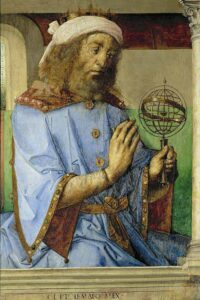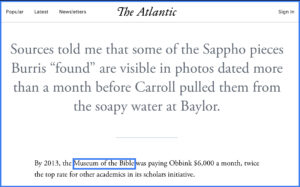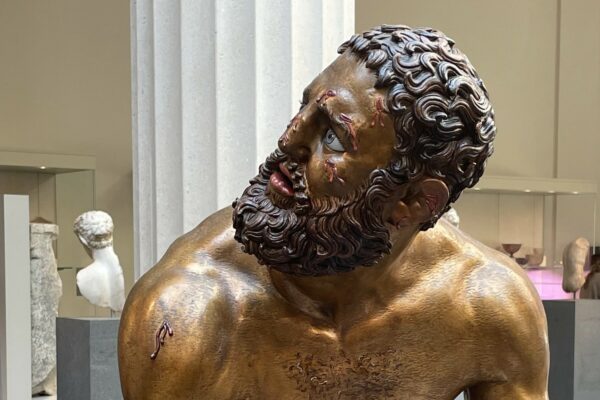
If Hipparchus were able to make corrections to the mathematical calculations on a Flat Earth website.
Episode 41: In which Ptolemy and Aristotle throw shade at Hipparchus (get it?), and Pliny learns that Sappho hates Hobby Lobby.
This episode of Real Housewives of Mt. Olympus brought to you by the latest archaeological news on SmithsonianMagazine.com – and by CLAS-C 351 Change and Innovation in Ancient Greece.
[SETTING: Underworld Scientific Academy]
PLINY THE ELDER, ANCIENT SCIENTIFIC WRITER AND TERRIBLE VULCANOLOGIST: Good news, everyone! The mortals have discovered evidence for the earliest known star chart!
PTOLEMY, ANCIENT SCIENTIFIC WRITER AND TERRIBLE ETHNOGRAPHER: They found more copies of my star charts from The Almagest?
PLINY THE ELDER: Um, no, actually. It appears they have found a copy of Hipparchus’ original text that you quoted. Is he around?
ARISTOTLE, ANCIENT PHILOSOPHER AND SCIENCE NERD: Hipparchus? That hack? I think he’s off calculating something somewhere. Poor fool never did get used to being underground. Always moaning about needing to actually see the stars and planets. Really brings down the mood, if that’s even possible in the Underworld.

Hanging with the cool kids.
PLINY THE ELDER: Well, he did need to observe the movements of the Heavens to make his amazingly accurate calculations and predictions of astronomical phenomenon. Mortal scholars are still debating what tools he may have used to perform the mathematical miracles that he did.
ARISTOTLE: Nonsense. I invented an entire theory of how the universe was structured, and explained the movement of the stars and planets, and all I needed was a vague understanding of celestial phenomenon.
PLINY THE ELDER: Yes, but it turns out your theory was essentially nonsense. In fact, that’s a good deal of what Hipparchus was working on, trying to reconcile your cosmological model to, well, reality.
PTOLEMY: Where did they find this supposed Hipparchus text? How do they know it’s not my work?
PLINY THE ELDER: From what I can tell, they found a passage of text that includes some notes about contemporary star positions. And if you do some very complicated math…
ARISTOTLE: (snorts)
PLINY THE ELDER: …you can tell that the original author was writing in about 2150 years ago, because that’s when the stars were in that alignment. Which puts it about 300 years too early for you. Neat, right?
PTOLEMY: They found Hipparchus’ original notes? That can’t be possible. I’m the astronomer that all the Byzantine and Arabic scholars loved. I’m the one whose manuscripts they carefully copied by hand over and over, throughout the generations.

And you thought your constellation app was complicated.
PLINY THE ELDER: Well, turns out that’s not strictly true. Apparently someone did copy Hipparchus at some point. What the mortals have found is a copy of Hipparchus’ calculations in a Christian manuscript that dates to somewhere in the 5th to 8th centuries after that Jesus fellow.
PTOLEMY: Why would these Christians use Hipparchus’ models? They could have used mine.
ARISTOTLE: Or mine.
PLINY THE ELDER: Well, actually the Hipparchus text was underneath the Christian text. The monks needed to reuse some parchment, so they erased the copy of the Hipparchus text and wrote on top of it. Honestly, these Christian monks don’t seem to have been into astronomy. And later leaders of the church were really not into astronomy.
ARISTOTLE: If these monks erased the copy of Hipparchus, how could modern mortals even tell it was there? This is nonsense. Unless Ptolemy, you were correct, and humans can shoot super beams out of their eyes…
PLINY THE ELDER: Sort of? The mortals have this technology where they can scan a manuscript and see trace elements on the page. All those marvelous pigments that I wrote about? They can reconstruct the erased text based on what elemental signatures they find, which are particular to various pigments. It’s really neat. I feel like I’ve contributed.
PTOLEMY: So, the monks actively destroyed the copy of Hipparchus’ text. That makes me feel better. King of Ancient Astronomy once more!

The real joke here is that I wrote that “King of Ancient Astronomy” line before I even found this picture.
PLINY THE ELDER: I mean, technically the monks also accidentally preserved the text. The only reason the manuscript was under investigation was because a family called the Greens wanted to put it in the Museum of the Bible. Did you guys just hear a woman screech in rage?
ARISTOTLE: We’re in the Underworld, someone’s always screeching in rage. What’s a Bible?
PLINY THE ELDER: As far as I can gather, it’s a text that outlines the things Jews and Christians have to believe in.
PTOLEMY: Like a rule book?
PLINY THE ELDER: Vaguely? But most of it is in story form. Kind of like Ovid’s Metamorphosis, only if you killed people for disagreeing with it. At one point there’s this flood, and it’s really important to save the animals for some reason…
ARISTOTLE: Writing down required religious beliefs? What a strange concept. Although I can see why this Green family would want to preserve manuscripts, if that is their starting point.
PLINY THE ELDER: There’s that screech again. Can you guys seriously not hear that?
OVID, ANCIENT ROMANTIC POET AND WINGMAN: (popping head around poplar gate) Hey nerds, I was over in the Grove of Poets trying to score with Sappho, and she suddenly flipped out screaming about some green mortal family? Apparently she turns over in her grave when anyone mentions them, and she said the ping was coming off somewhere in here. Can you do me a favor and cut out whatever you’re doing so I can get the mood back? Obviously I can tell just by looking at you that none of you are getting any afterlife action, but that doesn’t mean the rest of us have to suffer (makes a quick exit).
PTOLEMY: I really hate that guy. I hope Sappho turns him down flat.
ARISTOTLE: Ugh, there goes a hysterical woman again. What possible connections could Sappho have to a living family interested in religious texts?

Well this can’t be good.
Share on Twitter, or Instagram, or really wherever you want.
To explore how the ancient Greeks mastered complex mathematics and science (and also got really confused about those same topics), enroll in CLAS-C 351 Change and Innovation in Ancient Greece, coming up Spring 2023 with no pre-reqs! Or to learn more about how the ancients understood the natural world around them, enroll in our new 1-credit “appetizer” course CLAS-B 314 The Environment in the Ancient World, also coming in the second-third of Spring 2023 with no pre-reqs. Can’t get enough of Ancient Greece and Rome? Earn a Classics Minor in just 15 credits!


